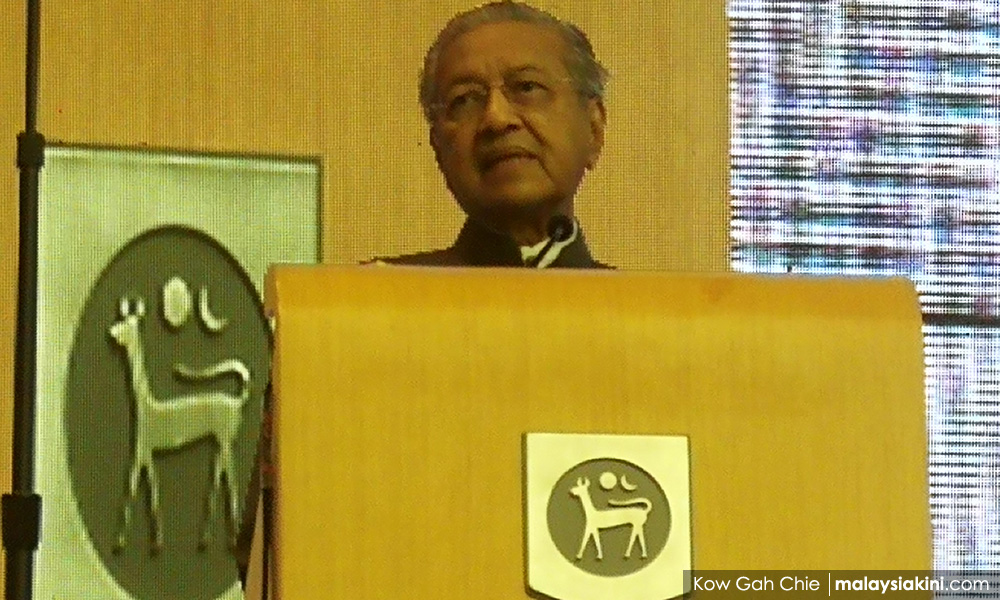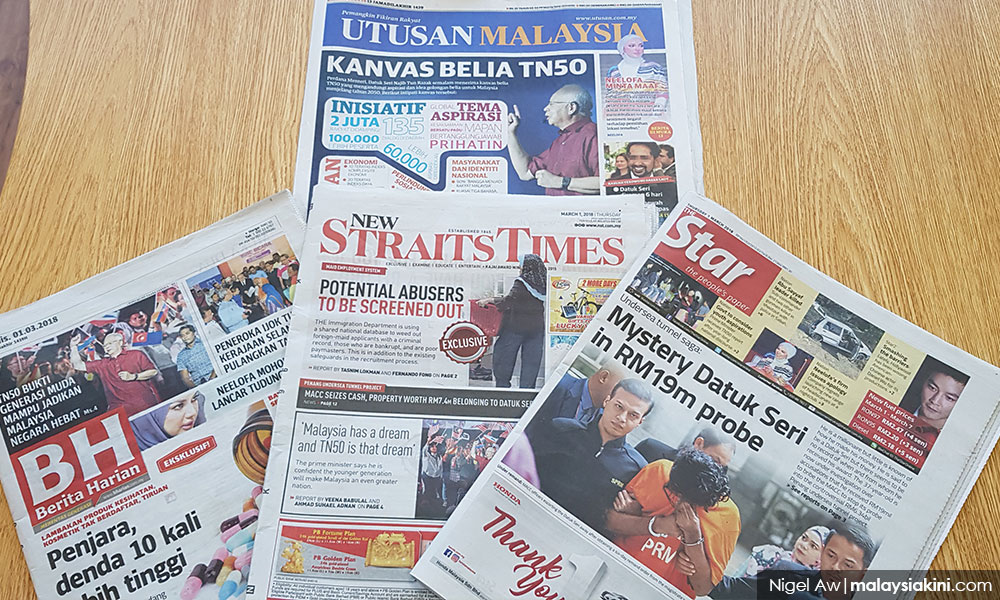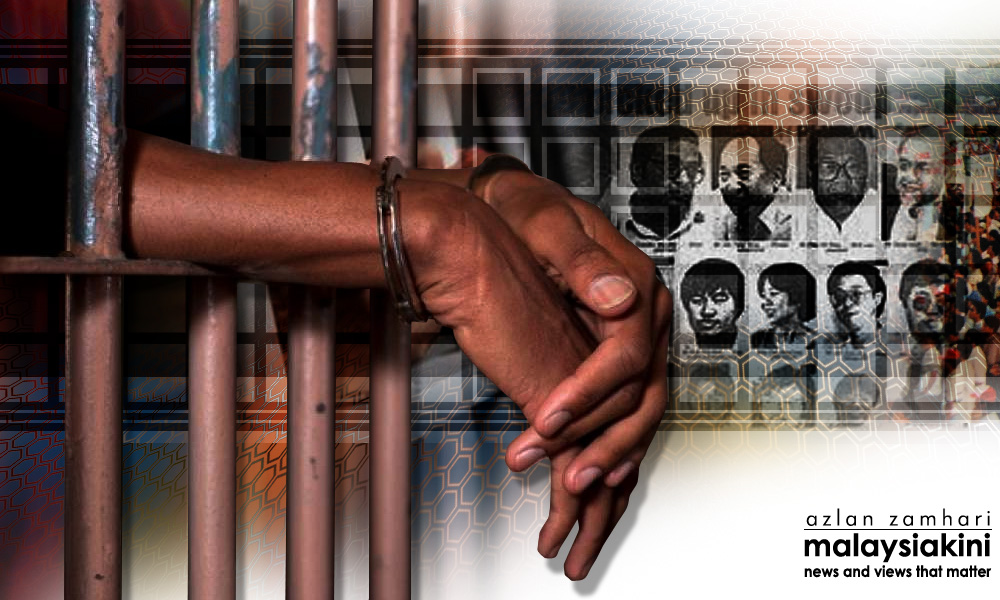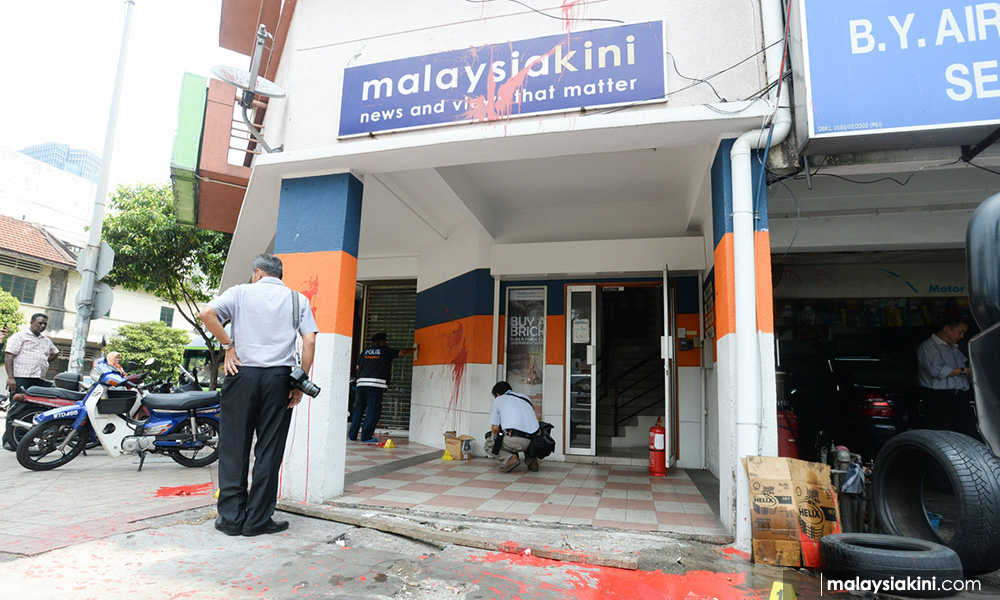From Malaysiakini:
Mahathir's mixed media legacy
OPINION | ERIC LOO
Published: | Modified: 
COMMENT | One is never too young to learn, nor too old to lead in politics. A 26-year-old youth and sports minister has yet to leave an impression, even as our 94-year-old prime minister focuses on “setting Malaysia on the road of recovery” from years of graft and corruption under the Najib administration.
Dr Mahathir Mohamad’s birthday wish on July 10 sounds like he is seeking to reinvent a legacy as he necessarily fades from politics with a trail of mega projects - from Proton and Petronas Twin Towers to Putrajaya and Multimedia Super Corridor – indelibly marking for posterity his decades of, at times, Machiavellian leadership.
I recall the optimism of the 2M (Mahathir-Musa) government in the early 80s: “leadership by example”, “clean, efficient and trustworthy government”, “Look East”. The turn of the century brought “Malaysia Boleh” and “Vision 2020”. An agro-based economy was transformed into one of science, technology, service-oriented and knowledge-based.
Be that as it may, the good memories come with the not-so-good ones from Mahathir’s 22 years as prime minister, who once quipped his biggest mistake in life was choosing Najib to be the 6th prime minister.
As a reporter in the late 70s to early 80s, I was mindful of the Mahathir administration’s response to any critical media attempts to expose cronyism, corruption and institutionalised discrimination that was endemic in the patronage system, which persists in today’s federal and local politics.
Mahathir’s pragmatic, or as some might say, semi-authoritarian handling of the media during his previous public life is one memory that sticks. He defined acceptable media methods and practices by one very clear premise: journalists are free to think what they like, but they will not be allowed to say what they think, simply because they are not completely righteous, incorruptible nor infallible.

The media is like a double-edged sword. Placed in the proper hands like a surgeon wielding a scalpel, it produces positive outcomes. Placed in the wrong hands, the media harms. It destroys. It undermines national security.
Going by Mahathir’s interpretation, the media should fundamentally be directed towards national development outcomes. Any deviation from what the government judges to be acceptable and responsible practice will be restored to order.
(Mahathir's archived speeches on press freedom can be viewed at the Prime Minister's Office website.)
Mahathir’s contentious relationship with the media during his decades of leadership shows the rocky road that journalists had to tread to remain gainfully employed:
1984: Following a media leak on the Bumiputra Malaysia Finance loan scandal, the Official Secrets Act 1972 and Printing Presses Act 1948 were amended to empower the home affairs minister to ban any publication, including foreign ones, that undermine public or national safety.
1987: Printing Presses and Publications Act (PPPA) was amended to give the home affairs minister “absolute discretion, which was not to be questioned in any Court of Law, to ban publications present and future which he considered prejudicial to public order morality or security, or likely to be prejudicial to the public or national interest”.

Operation Lalang was imposed in October of the same year to weed out dissidents. The Star, Sin Chew Jit Poh and Watan were closed under the ISA and PPPA for their reporting of the Umno-MCA conflict. Their publishing licences were restored after a few months.
June 1994: The licence of Thootan, a Tamil biweekly magazine, was withdrawn for its reporting of a stock market scandal involving Maika-Telekom. Maika was an investment arm of MIC.
July 1998: Editors of Berita Harian and Utusan Melayu resigned, about two weeks after Mahathir criticised the media for "negative" and "sensational" reporting of problems at the new Kuala Lumpur International Airport (KLIA).
1998-1999: CNN and CNBC coverage of the arrest and trials of Anwar Ibrahim on charges of sodomy were censored. BBC and ABC news feeds were jammed.
May 3, 1999: World Press Freedom Day, 581 journalists proposed to the home affairs minister (who was also the prime minister) to set up an independent media council to replace the PPPA. The Media Council proposal was taken on board (which the Pakatan Harapan government is still considering today). Journalists continue to petition for a PPPA to be repealed on each World Press Freedom Day.
2001: Far Eastern Economic Review, Asian Wall Street Journal and Asiaweek are banned in Malaysia for reporting on the government, based on "unauthorised" information.
Jan 16, 2002: Forty journalists and the editor at The Sun resigned following a misleading report of a suspected plot to assassinate Dr Mahathir.

Jan 20, 2003: Police raided the Malaysiakini office in Bangsar following a complaint by Umno Youth of a ‘seditious’ letter posted on the website on Jan 9.
(The Malaysian Communications and Multimedia Commission also raided Malaysiakiniand The Star offices on Nov 6, 2015, for reporting on “the transfer of a deputy public prosecutor attached to the Malaysian Anti-Corruption Commission”.
Mahathir’s adversarial relationship with the press completely turned after he stepped down in October 2003, succeeded by Abdullah Badawi. Mahathir then started his blog, chedet.cc, to express his discontent with Pak Lah’s administration, and subsequently his scorn for Najib and his cronies.
Mahathir’s most significant turn happened after his historic defeat of Umno last May when he committed Pakatan Harapan to repeal the Anti-Fake News Act, introduced by Najib to temper reporting of the 1MDB scandal.
Commenting on the repeal, Mahathir said in Singapore: “When we have a law that prevents people from airing their views, we are afraid the government itself may abuse it, as has happened with the last government.
“We do not want any government, this one and the succeeding ones, to make use of the law for the government itself to create fake news in order to sustain itself.
"Of course, it (fake news) will be difficult to handle, but we believe that we can accept the challenge and we can handle it.”
Mahathir was largely shaped by circumstances of his time. Hence his seminal book, "The Malay Dilemma"; his straight-shooting persona he projected to the media in the West, and as a maverick in defying conventional wisdom by pegging the ringgit to the dollar during the 1997 Asian financial crisis, much to the chagrin of the International Monetary Fund and dismay of financial analysts, who in hindsight admitted that Mahathir was right and a trouble-making recalcitrant
I do not know for sure whether Mahathir embodies all that is noble and righteous in the likes of Nelson Mandela, a statesman he much admires; or whether, with the Pact of Hope, he will govern justly in his remaining years.
What’s clear is that decades of being perceived as a ‘benevolent dictator’ and an ‘enemy of the press’ have not doused Mahathir’s quirky political wit, nor his ad lib remarks now memorialised in BrainyQuotes.
ERIC LOO is a Senior Fellow (Journalism) at the School of the Arts, English & Media, Faculty of Law, Humanities & Arts, University of Wollongong. He is also the founding editor of Asia Pacific Media Educator.
From May 9 2018 until today, the press in Malaysia has had more freedom, including to criticise the government, than all the previous 61 years since Merdeka.
ReplyDeleteSo don't talk cock.
Anyone can learn from his past mistakes. I think Mahathir deserves a second chance.
ReplyDeleteAfter 6 decades of BN government resulting in Malaysia falling almost to the bottom of the World Press Freedom Index rankings, Malaysia now makes a huge improvement in 1 year of Harapan rule.
ReplyDeleteQUOTE
Malaysia’s ranking improves in press freedom index
Friday, April 19th, 2019
Malaysia has climbed up 22 places to 123rd, out of 180 countries in World Press Freedom Index 2019 compiled by Reporters Without Borders (RSF).
Malaysia surpassed other South-East Asian countries as Indonesia is currently ranked at 124th place, the Philippines (134th), Thailand (136th), Myanmar (138th), Cambodia (143rd), Singapore (151st), Brunei (152nd), Laos (171st) and Vietnam (176th).
The country’s global score dropped by 10.67 points to 36.74 points in 2018, indicating a healthier environment for media practitioners.
“Press freedom is receiving a breath of fresh air in Malaysia after former Prime Minister (PM) Datuk Seri Mohd Najib Razak’s ruling coalition suffered a surprising defeat in the May 2018 general election, its first defeat in modern Malaysian history,” a statement by RSF read.
UNQUOTE